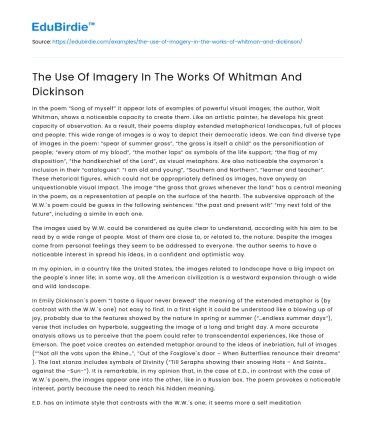In the poem “Song of myself” it appear lots of examples of powerful visual images; the author, Walt Whitman, shows a noticeable capacity to create them. Like an artistic painter, he develops his great capacity of observation. As a result, their poems display extended metaphorical landscapes, full of places and people. This wide range of images is a way to depict their democratic ideas. We can find diverse type of images in the poem: “spear of summer grass”, “the grass is itself a child” as the personification of people; “every atom of my blood”, “the mother laps” as symbols of the life support; “the flag of my disposition”, ”the handkerchief of the Lord”, as visual metaphors. Are also noticeable the oxymoron´s inclusion in their “catalogues”: “I am old and young”, “Southern and Northern”, “learner and teacher”. These rhetorical figures, which could not be appropriately defined as images, have anyway an unquestionable visual impact. The image “the grass that grows whenever the land” has a central meaning in the poem, as a representation of people on the surface of the hearth. The subversive approach of the W.W.´s poem could be guess in the following sentences: “the past and present wilt” “my next fold of the future”, including a simile in each one.
The images used by W.W. could be considered as quite clear to understand, according with his aim to be read by a wide range of people. Most of them are close to, or related to, the nature. Despite the images come from personal feelings they seem to be addressed to everyone. The author seems to have a noticeable interest in spread his ideas, in a confident and optimistic way.
Save your time!
We can take care of your essay
- Proper editing and formatting
- Free revision, title page, and bibliography
- Flexible prices and money-back guarantee
In my opinion, in a country like the United States, the images related to landscape have a big impact on the people´s inner life; in some way, all the American civilization is a westward expansion through a wide and wild landscape.
In Emily Dickinson´s poem “I taste a liquor never brewed” the meaning of the extended metaphor is (by contrast with the W.W.´s one) not easy to find. In a first sight it could be understood like a blowing up of joy, probably due to the features showed by the nature in spring or summer (“…endless summer days”), verse that includes an hyperbole, suggesting the image of a long and bright day. A more accurate analysis allows us to perceive that the poem could refer to transcendental experiences, like those of Emerson. The poet voice creates an extended metaphor around to the ideas of inebriation, full of images (“”Not all the vats upon the Rhine…”, “Out of the Foxglove´s door – When Butterflies renounce their dreams” ). The last stanza includes symbols of Divinity (“Till Seraphs showing their snowing Hats – And Saints… against the -Sun-”). It is remarkable, in my opinion that, in the case of E.D., in contrast with the case of W.W.´s poem, the images appear one into the other, like in a Russian box. The poem provokes a noticeable interest, partly because the need to reach his hidden meaning.
E.D. has an intimate style that contrasts with the W.W.´s one; it seems more a self meditation about feelings that a depiction of ideas and opinions (in fact the author was not very interested in the publication of her poems).
As a conclusion, I could say that the images in the W.W. poem lead the reader to a sense of exultation and community with all the mankind, felt in an optimistic way. By the other hand, the images of the E.D. poem provoke, in my opinion, a close empathy with the author feelings, depicted through a veil of uneasiness.






 Stuck on your essay?
Stuck on your essay?

